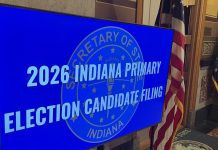Lawmakers Make Major Changes To Casino, Sports-Betting Bill
State lawmakers significantly amended a major gambling bill on Wednesday, removing language that would have allowed mobile sports betting and adding a huge relocation fee for the owner of the Gary’s casinos.
The Indiana House Public Policy Committee approved the amendments authored by committee chairman Rep. Ben Smaltz, R-Auburn, despite concerns from some representatives.
The changes to Senate Bill 552 included adding a $100 million fee for moving one of the casinos in Gary from Buffington Harbor on Lake Michigan to another part of the city. They also removed a provision that would have allowed horse-track casinos to offer live-dealer table games this year instead of the already approved date of of 2021 and eliminated the financial support other communities, associations and casinos would have received if the Gary casinos are moved.
In addition, the amendment also eliminated the language that allowed sports wagering outside of bricks-and-mortar locations and required official sports league data to be used for in-game bets—those made when a game is already in progress, not just on a contest’s outcome but on individual plays or in-play statistics.
Professional sports organizations including the NFL, NBA, MLB, IndyCar and the PGA Tour had been pushing for official data use to be required, but casinos were opposed to the idea.
The updated version of the bill, which was authored by Republican Sens. Mark Messmer of Jasper and Jon Ford of Terre Haute, would still allow Spectacle Entertainment, the new owner of Gary casinos Majestic Star I and Majestic Star II, to use one casino license to open a new facility in Gary and move the other license to Terre Haute.
But the legislation also creates a competitive process to determine which casino operator could open a facility in Terre Haute, which means Spectacle wouldn’t be guaranteed permission to move forward on that location.
The bill still remove limits on the number of casinos one operator can control in the state.
Several committee members had concerns with the $100 million price tag Spectacle would have to pay just to move one casino in Gary.
“That’s an extreme amount of money,†Rep. Sean Eberhart, R-Shelbyville, said.
Eberhart said he didn’t understand why they were charging any fee. He said if a company came to the state and said it wanted to invest hundreds of millions of dollars in a community, the state would be handing out tax incentives, not making the company pay to move here.
Spectacle hopes to use one license for a new $300 million casino along the Interstate 80/94 corridor in Gary and proposed a $100 million to $150 million casino in Terre Haute for the other license. The existing casino boats in Buffington Harbor would be closed and removed.
“I think that should mean something, that we have Indiana folks that are willing to step up and take this risk,†Eberhart said.
Smaltz said the price could be amended as the bill moves through the legislative process, but it’s difficult to determine the right price because the state has never allowed an already-open and operating casino to move miles away from its on-water location.
Lawmakers previously moved the license originally intended for Patoka Lake to French Lick, but that occurred before the casino opened. The General Assembly also passed a law in 2015 that allows riverboat casinos to shift to land-based locations adjacent to their docks, but the Gary move would be a much greater distance.
“It is unprecedented,†Smaltz said. “We’re just trying to take it slow and careful and we’ll see what happens in the next step.â€
John Keeler, general counsel for Spectacle, said he doesn’t think there should be any cost imposed for the company to move the casinos.
“It’s a pretty significant price,†Keeler said. “But it’s a process and we’ve gotta work through it.â€
Rep. Terri Austin, D-Anderson, said she had concerns about the state taking a license away from a company that purchased it, which is essentially what would happen should Spectacle not be selected in the competitive process for the Terre Haute casino.
“It certainly could have a chilling effect,†Austin said.
But Smaltz said the licenses that allow casinos to operate are the property of the state and, in his opinion, Spectacle would essentially be relinquishing those licenses when it closes the existing Gary casinos.
Another change that drew concerns was the removal of the provision that allowed gamblers to place sports bets on computers and mobile devices—something advocates for sports wagering have said is key in making legal sports betting viable, because a significant portion of illegal sports betting is happening on smartphones.
The revised bill only authorizes sports wagering at casinos, racinos and satellite facilities.
“It’s a little disappointing,†Ford said. “I believe it’s an important part to bring the illegal market into sports wagering so we can regulate it.â€
Ford said he hopes to see it added back in before final passage.
Rep. Ed Clere, R-New Albany, also questioned removing that provision, saying “it denies the reality†of what people are using their phones for today.
Smaltz said he removed computer betting because he’s worried it could quickly lead to a huge expansion of all gaming, with residents arguing they should be able to gamble on other games away from casinos, not just sports.
“If mobile is in, I think it goes from one to 100,†Smaltz said.
At least one committee member is also interested in reinserting language to allow live-dealer table games at racinos this year.
Eberhart said the only reason racinos had to wait until 2021 was because of then-Gov. Mike Pence threatened to veto the gambling bill in 2015 that allowed the live table games.
“It was simply the threat of a veto by Gov. Pence in 2015,†Eberhart said. “We have no threat of a veto from our current governor.â€
The amended bill moves to the House Ways and Means Committee, where more amendments are expected.
“Nothing, absolutely nothing, from this point forward will be easy about this,†Ways and Means Co-Chair Todd Huston said.




